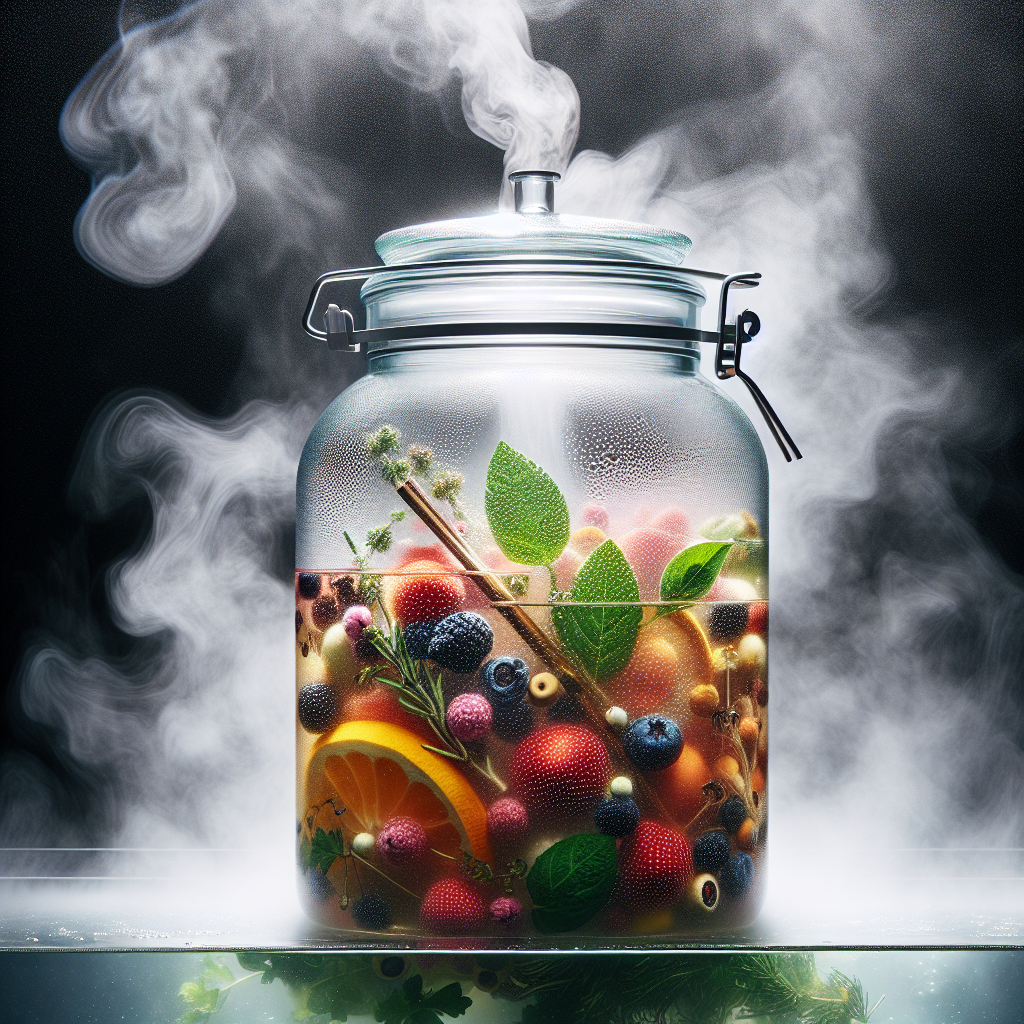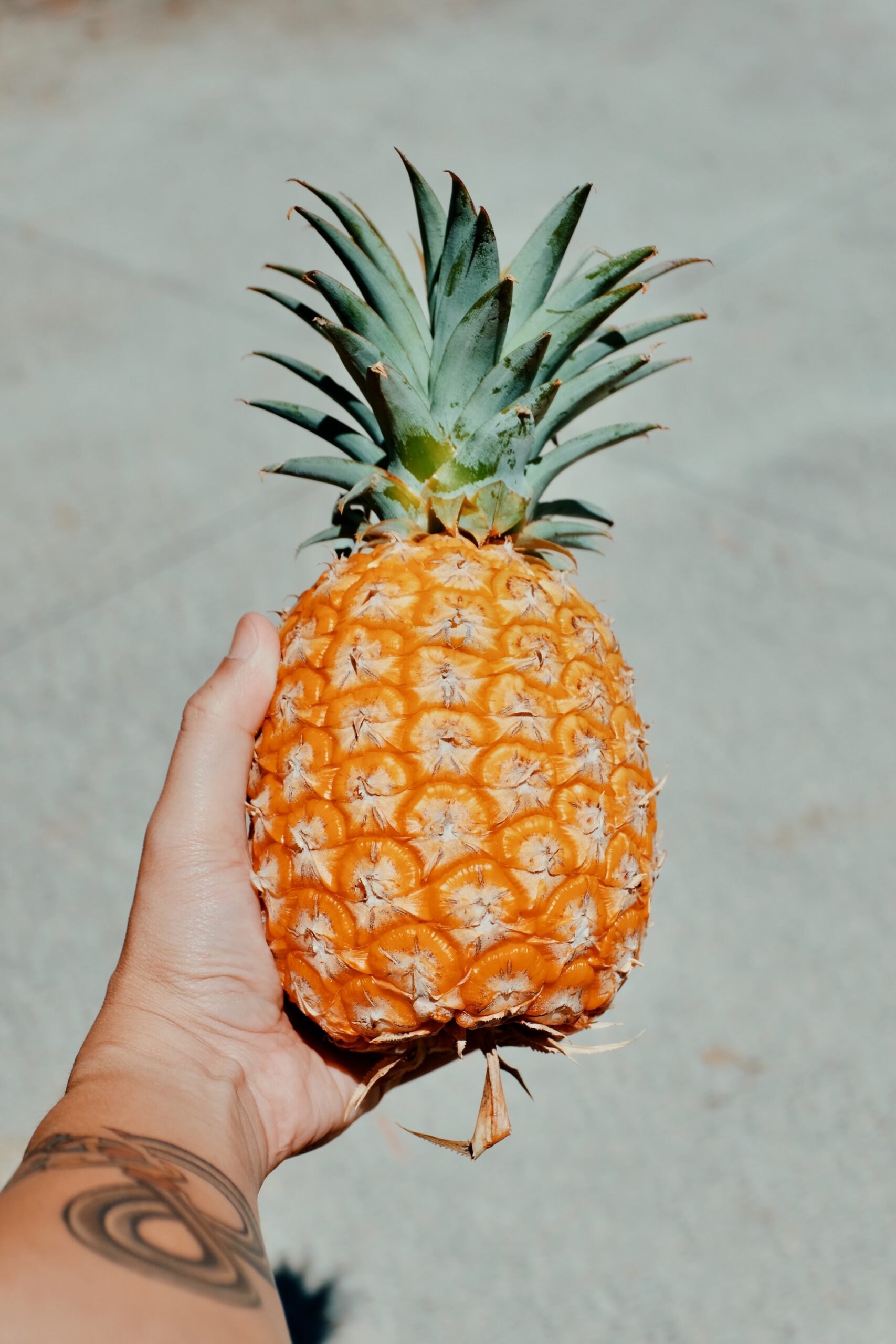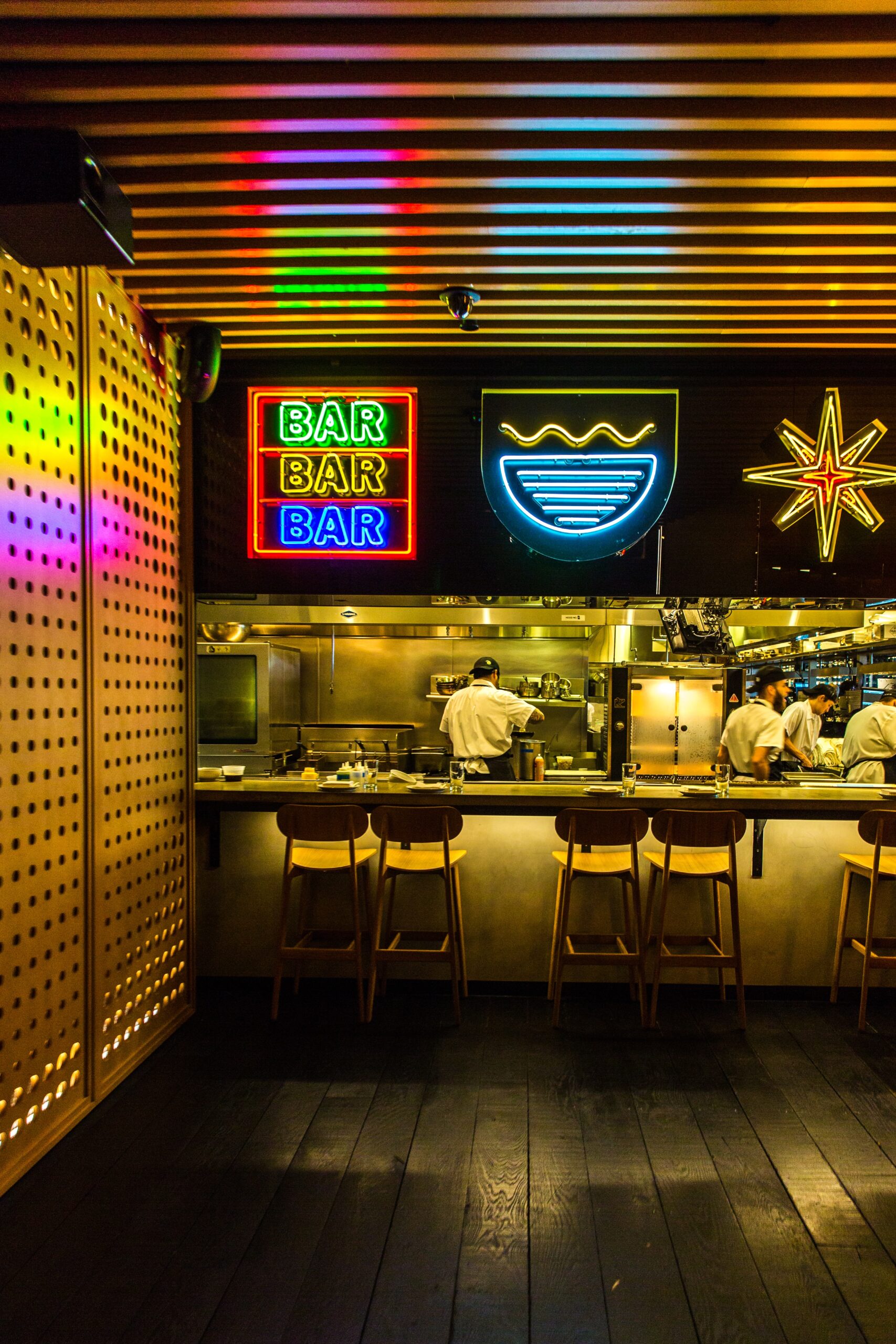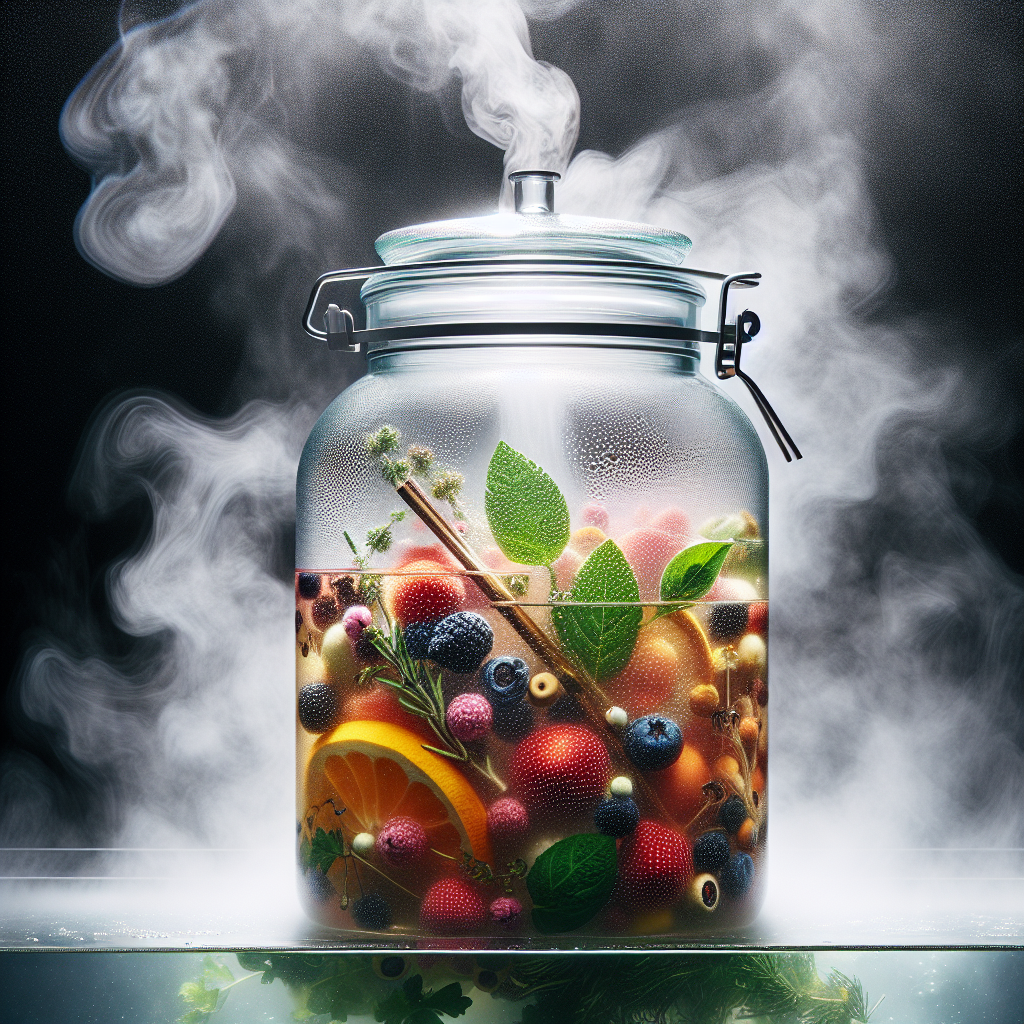
So you’re curious about sous vide cooking and wondering if you can incorporate alcohol into the mix? Well, the answer is yes, you absolutely can! Sous vide, a technique that involves cooking food in a precisely controlled water bath, can work wonders with alcohol-infused recipes. By vacuum-sealing your favorite ingredients and immersing them in a warm bath of water and alcohol, you can unlock a whole new world of flavors and textures. From tenderizing meats with a rich beer marinade to infusing fruits with the essence of fine wine, sous vide offers endless possibilities for elevating your culinary creations. So let’s explore the exciting realm of sous vide with alcohol and uncover the secrets to mouthwatering dishes that will impress both your taste buds and your friends!

Choosing the Right Alcohol for Sous Vide
Sous Vide Basics
Sous vide is a cooking technique that involves sealing food in a vacuum-sealed bag and cooking it at a precise low temperature in a water bath. This method allows for even cooking and perfectly juicy and tender results. Adding alcohol to the sous vide process can enhance the flavor, tenderize the meat, and preserve nutrients. However, it is important to choose the right alcohol for sous vide to achieve the desired results.
Considerations for Alcohol Choice
When selecting alcohol for sous vide cooking, there are a few factors to consider. First and foremost, you want to choose an alcohol that complements the flavors of the dish you are preparing. Different types of alcohol have varying flavor profiles that can greatly impact the final taste. Additionally, the alcohol content of the chosen spirit should be taken into account, as it can affect the cooking process and overall outcome.
Flavor Profile of Alcohol
The flavor profile of the alcohol you choose will have a significant impact on the taste of your sous vide dish. Some alcohols, such as red wine, add depth and complexity to dishes like beef stew or braised short ribs. On the other hand, lighter spirits like vodka or white wine can add a subtle touch to delicate flavors like seafood or chicken. Whiskey and bourbon can lend a smoky and rich taste to dishes, while tequila adds a unique kick to Mexican-inspired recipes. It’s important to experiment with different alcohols to find the perfect match for your culinary creations.
Alcohol Content
The alcohol content in the chosen spirit is another crucial consideration. Since sous vide cooking involves long cooking times at low temperatures, the alcohol content can impact the cooking process. Higher alcohol content can slow down the cooking time, while lower alcohol content may not have the desired flavor infusion. It is advisable to strike a balance and choose an alcohol with a moderate alcohol content that suits the dish you are preparing.
Experimenting with Different Alcohols
Sous vide cooking allows for endless experimentation, and this includes using different types of alcohol. You can explore the world of flavors by trying out various spirits such as rum, gin, or even liqueurs like Grand Marnier or Amaretto. Each alcohol brings its own unique character to the dish, making sous vide cooking an exciting culinary adventure. Don’t be afraid to try unconventional combinations and discover new flavor combinations that elevate your dishes to the next level.
Benefits of Sous Vide with Alcohol
Enhanced Flavor Infusion
One of the key benefits of using alcohol in sous vide cooking is the enhanced flavor infusion it provides. When food is cooked in a vacuum-sealed bag with alcohol, the alcohol penetrates the ingredients and infuses them with its unique flavors. This adds depth, complexity, and richness to the dish, creating a culinary experience that goes beyond traditional cooking methods. The slow and controlled cooking process of sous vide maximizes the infusion of flavors, resulting in a truly memorable dining experience.
Tenderization of Meat
Alcohol can also act as a natural tenderizer for meat when used in sous vide cooking. The low and consistent cooking temperature breaks down the collagen in the meat, resulting in tender and juicy cuts. When combined with the alcohol, the flavor and tenderness of the meat are further enhanced. Whether you’re cooking a steak, pork tenderloin, or even chicken breasts, sous vide with alcohol can transform tough cuts into melt-in-your-mouth delicacies.
Preservation of Nutrients
Another advantage of cooking sous vide with alcohol is the preservation of nutrients. The sealed environment of sous vide cooking minimizes the loss of vitamins, minerals, and natural juices that can occur with other cooking methods. By incorporating alcohol into the sous vide process, you not only add flavor but also retain the essential nutrients of the ingredients, ensuring a healthier and more nutritious meal.
Safety Considerations
Ignition Point of Alcohol
It is important to be aware of the ignition point of alcohol when using it in sous vide cooking. Most alcohols have a relatively low ignition point, which means they can catch fire if exposed to an open flame. However, in sous vide cooking, the alcohol is sealed within the vacuum-sealed bag, minimizing the risk of ignition. It is crucial to handle the bags with care and avoid direct exposure to high heat, open flames, or sparks.
Proper Sealing of Bags
To ensure the safety of sous vide cooking with alcohol, it is essential to properly seal the bags. This prevents any leaks or spills that could potentially lead to a fire hazard. Invest in high-quality vacuum-sealed bags and ensure they are sealed tightly before placing them into the water bath. Regularly inspect the bags for any signs of damage or wear to avoid any accidents during the cooking process.
Cooking at the Right Temperature
Cooking sous vide with alcohol requires maintaining a precise temperature throughout the cooking process. It is important to follow the recommended cooking temperatures for different types of meat and alcohol-infused recipes. This ensures that the food reaches a safe internal temperature, eliminating any potential foodborne illnesses. Use a reliable sous vide machine or immersion circulator to accurately control the water temperature and achieve perfect results every time.
Monitoring Alcohol Vapors
Although sous vide cooking with alcohol is generally safe, it is recommended to be cautious and monitor the alcohol vapors during the cooking process. Ensure that the cooking area is well-ventilated to prevent the buildup of vapors, which can be potentially flammable. Opening the bags in a well-ventilated area after cooking can help dissipate any lingering alcohol vapors and reduce the risk of ignition. Always prioritize safety when handling alcohol during sous vide cooking.
Sous Vide Recipes with Alcohol
Sous Vide Cocktails
Sous vide is not just limited to cooking food; it can also be used to create delicious and unique cocktails. By infusing alcohol with various fruits, herbs, and spices in a vacuum-sealed bag, you can achieve flavor combinations that are impossible to achieve with traditional mixology methods. Whether you’re looking to create a perfectly balanced Negroni or a refreshing watermelon margarita, sous vide cocktails offer a whole new world of mixology possibilities.
Alcohol-Infused Meat Dishes
Sous vide cooking with alcohol is particularly well-suited for meat dishes. From beef and lamb to pork and poultry, incorporating alcohol can elevate the flavors and tenderness of the meat. Imagine a tender and succulent red wine-infused beef stew or a whiskey-glazed pork tenderloin that melts in your mouth. The slow and controlled cooking process of sous vide ensures that the alcohol penetrates the meat, resulting in a taste sensation that is hard to beat.
Infused Fruits and Vegetables
Alcohol-infused fruits and vegetables can add a touch of sophistication to your sous vide dishes. By combining fresh produce with spirits like rum, vodka, or brandy, you can create unique flavor combinations that enhance the natural sweetness and aroma of the ingredients. Try infusing peaches with bourbon for a boozy summer dessert or experiment with sous vide-infused pears in red wine for an elegant and flavorful accompaniment to a cheese platter.

Tips for Sous Vide Cooking with Alcohol
Using Alcohol as a Marinade
One of the simplest ways to incorporate alcohol into sous vide cooking is by using it as a marinade. Marinating meat or vegetables in alcohol before placing them in the vacuum-sealed bag can enhance their flavors and tenderize the ingredients. The alcohol will infuse the food during the sous vide cooking process, resulting in a well-seasoned and succulent dish. Experiment with different marinades and cooking times to find the perfect balance of flavors.
Pairing Alcohol with Ingredients
When sous vide cooking with alcohol, it is important to consider the flavor profiles of both the alcohol and the ingredients you are using. Take into account the natural flavors of the meat, fish, or vegetables and choose an alcohol that complements and enhances those flavors. Lighter ingredients may pair well with white wine or citrus-infused spirits, while heavier meats can benefit from the richness of red wine or bourbon. Understanding flavor combinations will help you create perfectly balanced sous vide dishes.
Adjusting Cooking Times and Temperatures
Introducing alcohol into the sous vide cooking process may require adjusting the cooking times and temperatures. High-alcohol spirits like whiskey or rum may require longer cooking times to fully infuse their flavors into the dish, while lighter alcohols like white wine may require shorter cooking times. Experimentation is key to achieving optimal results. Keep notes of the cooking times and temperatures you use for each alcohol-infused dish to create a repertoire of perfectly cooked sous vide recipes.
Common Mistakes to Avoid
Using Low-Quality Alcohol
The quality of the alcohol you choose for sous vide cooking can greatly impact the final taste and enjoyment of your dish. Using low-quality or poorly flavored alcohols can result in disappointing results. Invest in a good selection of spirits and choose ones that you enjoy drinking on their own. High-quality alcohols will add depth and complexity to your sous vide dishes, making them truly stand out.
Overcooking or Undercooking
Achieving the perfect level of doneness is crucial in sous vide cooking, especially when alcohol is involved. Overcooking can result in dry and tough meat, while undercooking can leave your dish with a raw or unpleasant texture. Make sure to follow recommended cooking times and temperatures for each type of meat or vegetable you are preparing. Use a reliable sous vide machine and monitor the cooking process closely to avoid any mishaps.
Not Properly Sealing Bags
Properly sealing the bags is essential in sous vide cooking to prevent leaks, spills, or contamination. When using alcohol in sous vide recipes, ensuring a tight seal becomes even more important. Alcohol can potentially degrade the seal or cause leaks, affecting the cooking process and potentially causing safety hazards. Take your time to seal the bags properly, ensuring there are no punctures or gaps that could compromise the final results.

Alternative Methods for Infusing Alcohol
Rapid Infusion Techniques
If you’re looking for a quicker way to infuse flavors into alcohol, rapid infusion techniques can be a great option. By combining the alcohol and desired flavors in a pressure-rated canister, you can create full-flavored infusions in a fraction of the time. This method utilizes pressure to force the flavors to infuse into the alcohol, significantly reducing the infusion time. Rapid infusion techniques can be used as a complement to sous vide cooking or as a standalone method for creating unique infusions.
Cold Infusion Methods
Cold infusion methods are another alternative for infusing alcohol with flavors. Unlike traditional infusion methods, cold infusion involves steeping the ingredients in alcohol at room temperature or in the refrigerator over an extended period of time. This slow and gentle process allows the flavors to meld together without the need for heat. Cold-infused alcohols can bring out subtle nuances and delicate flavors that may be lost with other infusion methods.
Cleaning and Maintenance
Removing Residual Alcohol Odors
After cooking with alcohol in sous vide, you may notice lingering odors in your kitchen or on your sous vide equipment. To remove residual alcohol odors, thoroughly clean the vacuum-sealed bags, sous vide machine, and any other tools used in the cooking process. Use a mixture of warm water and mild dish soap to clean the equipment, making sure to rinse it thoroughly afterwards. This will help eliminate any traces of alcohol and prevent the transfer of unwanted flavors to future dishes.
Cleaning the Sous Vide Equipment
Proper maintenance and cleaning of your sous vide equipment is essential to ensure its longevity and optimal performance. After each use, clean the water bath, sous vide machine, and accessories according to the manufacturer’s instructions. Regularly descale the water bath to remove any mineral buildup and sanitize all components to prevent bacterial growth. Taking the time to clean and maintain your sous vide equipment will ensure that it continues to deliver precise and reliable results with every use.

Exploring Non-alcoholic Alternatives
Using Vinegars or Fruit Juices
If you prefer to avoid alcohol in your sous vide cooking, there are plenty of non-alcoholic alternatives that can be used to infuse flavors. Vinegars, such as balsamic or apple cider vinegar, can add tanginess and depth to your dishes. Fruit juices, such as citrus or berry juices, can also provide sweetness and acidity. Experiment with different alternatives to find the flavors that suit your palate and the specific dish you are preparing.
Infusing Non-alcoholic Spirits
Non-alcoholic spirits have gained popularity in recent years and can be a great substitute for alcoholic infusions. These spirits mimic the flavors and aromas of traditional alcoholic spirits without containing any alcohol. They can be used in sous vide cooking to add depth and complexity to your dishes without the need to worry about alcohol content. Explore the wide range of non-alcoholic spirits available on the market and experiment with different flavors to create unique and flavorful sous vide recipes.
Conclusion
Choosing the right alcohol for sous vide can greatly enhance the flavor, tenderness, and overall dining experience of your dishes. Consider the flavor profile and alcohol content of different spirits to find the perfect match for your culinary creations. While cooking with alcohol in sous vide has its safety considerations, proper handling and monitoring can ensure a safe cooking environment. Experiment with different alcohol-infused recipes, adjust cooking times and temperatures accordingly, and avoid common mistakes to achieve exceptional results. Don’t be afraid to explore alternative methods for infusing flavors, clean and maintain your sous vide equipment, and venture into non-alcoholic alternatives for unique and memorable sous vide cooking experiences. Cheers to delicious sous vide dishes with the perfect touch of alcohol!



